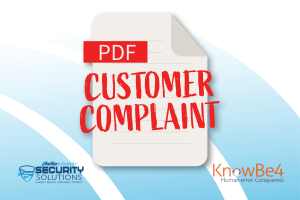
Security Tip of the Week – Online Shopping Steals
Cybercriminals create online stores that claim to sell hard-to-find items as they try to trick unsuspecting shoppers.
Each month, Keller Schroeder’s subject matter experts provide content about the latest tools, services, and technologies to help you understand how you can better grow, protect, and optimize your technical environments. We also share weekly cybersecurity tips and you can find business cultural and leadership knowledge from our President.

Cybercriminals create online stores that claim to sell hard-to-find items as they try to trick unsuspecting shoppers.

Cybercriminals impersonate customer complaints as a way to grab your attention and trick you into opening malware.

Recently, cybercriminals have been taking advantage of the upcoming holiday season in a shopping-based phishing attack.

In a recent phishing attack, cybercriminals imitate real people in fake call centers to convince you that a scam is legitimate.

A new cybercriminal group is sending out phony webinar invitations to phish their targets. Don’t fall for it!

Cybercriminals are using the square root symbol in their recent phishing scam to impersonate Verizon’s logo.

With a year full of high-profile data breaches, one cybercriminal has created the ultimate database.

Cybercriminals are using the release of the new James Bond film, No Time to Die, as phish bait to hook unsuspecting fans.

In a new phishing scam, cybercriminals use shortened LinkedIn URLs to sneak into your inbox. Don’t fall for this scam!

Spear phishing is a phishing attack that targets a specific person and appears to come from a trusted source.
Want to receive our monthly newsletter? Send us your contact info below to join our mailing list.